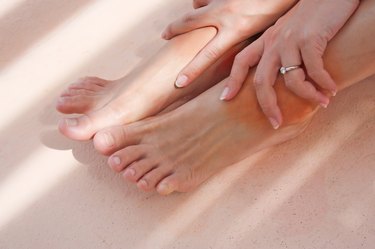
Water retention in the legs, ankles and feet is usually painless and treatable with home remedies. Fluid retention increases with age and is more common in those who have obesity or impaired circulation.
It may also be a sign of a serious underlying medical condition, such as kidney, liver or cardiovascular disease. For this reason, it is important to speak with your doctor about any new or worsening leg swelling, even if you appear to be in otherwise good health.
Video of the Day
Video of the Day
Step 1
Raise your legs above the level of your heart when you are lying down. Place one or two pillows under your heels and lower legs.
Step 2
Engage in regular exercise to keep fluid pumping back to your heart from your legs. If you have heart disease or another medical problem, consult your doctor before beginning a new exercise program.
Step 3
Drink extra water to relieve legs that are retaining water. While it may seem counterproductive to increase water intake when you are trying to reduce water retention, drinking extra fluids actually helps by flushing sodium and other toxins from your tissues.
Step 4
Reduce the amount of sodium in your diet by limiting your use of table salt, skipping processed meats and foods, and choosing low-sodium food options when they are available.
Step 5
Wear compression hose to improve the circulation in your legs, and avoid wearing clothing that fits tightly around your ankles or waist.
Step 6
Take frequent breaks to get up and move around when working at the computer, riding in a car, flying on a plane or sitting for prolonged periods for other reasons.
Step 7
Lose weight if you have overweight or obesity. These conditions can interfere with circulation and forces your heart to pump harder to circulate fluids from your legs back to your heart.
Step 8
Speak with your doctor about medications you are taking that may be contributing to water retention in your legs. A change in medication or dosage may be helpful. Do not stop or adjust your medications without your doctor's permission.
Warning
Call for emergency medical help if you experience sudden swelling of your legs along with shortness of breath or chest pain. Call your doctor if you notice an increase in fluid retention and you are pregnant, have a fever or if you've been diagnosed with kidney disease or heart disease.